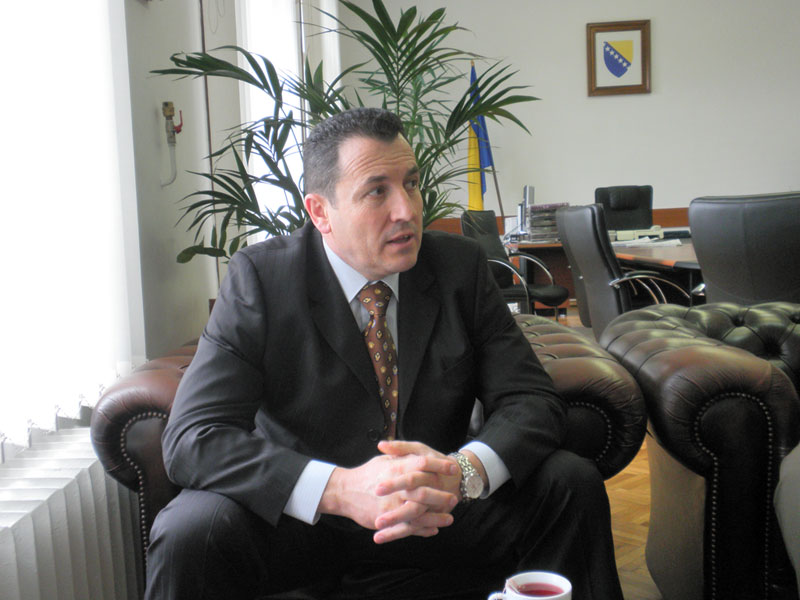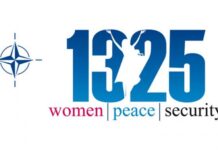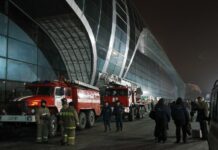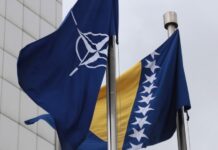BiH Defense Minister talks about the MAP, the BiH unit in Afghanistan, defense reforms, the public awareness campaign
Bosnia and Herzegovina got the Membership Action Plan (MAP). Did you expect such decision?
I am happy with the NATO’s decision. It is certainly much better than I expected.
You expected a rejection?  I actually expected the North Atlantic Council to be authorized to grant the MAP to BiH when we resolve the issue of immovable military property. Still, this is a great decision that makes me very happy, because it seems to me that the international community finally decided to appreciate the powers in BiH which are committed to progress and reforms.
I actually expected the North Atlantic Council to be authorized to grant the MAP to BiH when we resolve the issue of immovable military property. Still, this is a great decision that makes me very happy, because it seems to me that the international community finally decided to appreciate the powers in BiH which are committed to progress and reforms.
Let me remind you that the whole state is moving towards NATO, not just its armed forces or defense structures. Of course, I can talk about readiness or competence of the defense forces. After its meeting in December last year, NATO said that the defense reform in BiH was effective, and that defense structures fulfilled their obligations. But, the country as a whole is not able to make significant decisions and to implement necessary reforms, etc. In the context of upcoming elections and the behavior of state and political structures, NATO will be deciding on what consequences will be produced by one or another decision. I think it is better that NATO supports pro-NATO, pro-Bosnian forces which are ready to make efforts towards progress, and not the ones which act differently.
What do you see as biggest barriers to the BiH accession to NATO?
In many aspects of its internal development and attempts to upgrade its existing system, BiH faces the biggest barriers when it comes to reaching a relevant political consensus and taking specific measures needed for the internal progress and the progress on international level. Thus, the biggest problem is that there are different opinions on how to arrange certain things, how to organize them, and which way and direction to choose. The fact that the country has not been fully reconstructed – in the sphere of its spirit, international relations, social relations, establishing state institutions, and especially economic development – is a very practical obstacle for any kind of progress.
Are you afraid of new protests of the armed forces members whose service is going to expire soon and they will not get a severance pay?
I don’t think it is appropriate for the Ministry of Defense to be afraid of anything. You see, when it comes to the law and the contents of the contracts, the soldiers whose contracts expire this year have no foundation to protest. In a human sense, the Ministry of Defense has been doing much more than is obliged by the law and will continue to make efforts, but in a very constructive, very responsible way. As for me, I have a full consensus with the soldiers. I think there is much more talk here about speculations which are coming from those who try or, at least, expect to buy some political points in the pre-election campaign. However, as many points they buy on one side, that many they will lose on the other. With the idea to stop the defense reform, to abolish the concept of professional army, and to stop the BiH’s advancement towards NATO, we will practically lose the possibility for several hundred, or even over 1,000 young people, to get their first job in BiH, instead of being forced to look for it somewhere in Canada, Australia, Sweden or America.
These are all aspects of the condition in which we find ourselves. Therefore, I have no fear in that sense. The Ministry of Defense has been dealing with this issue in a very responsible manner since May 2008. It has tested all its activities several times at the Parliament, the BiH Presidency, the Council of Ministers, and the Joint Committee for Defense and Security of both Houses, and it has a full permission to undertake many activities for which it perhaps doesn’t even have competencies. There is an obligation that we have as human beings, because we are talking about our former fellow soldiers. Thus, I am deeply convinced that we are on the best course to do this responsibly, rationally and legally, to insure a smooth flow within the organization and to provide some sort of a chance for employment for all those whose contracts will have expired this year.
Turkish Offer
When do you expect the BiH Armed Forces units to be deployed in the ISAF Danish contingent? How many BiH soldiers will go to Afghanistan?
The BiH Presidency tasked the Ministry of Defense to create a feasibility study within the Council of Ministers. In the study, we will evaluate the size of the unit and possible deployment timelines. I believe that, in any case, the unit will consist of less than 100 persons. When the Council of Ministers adopts the evaluation on mission justification, the Presidency confirms the decision, and the Parliament ratifies it, it will still take a few months to implement the procedure. Therefore, it is inappropriate to make more concrete predictions. Still, I expect that in a one or two month period we might be able to complete the feasibility study, and submit it to the Presidency. A practical decision of the Parliament should follow, and then concrete aspects of the Danish contingent’s readiness to accept a unit from BiH (in relation to its own cycles and rotations) will determine the date of deployment of the BiH unit to Afghanistan.
What about the Turkish offer for Afghanistan? It seems that it was the best and safest offer for BiH soldiers. It also seems that some historical myths were crucial in this case, and propaganda was much more important than security.
Thank you for asking this question. I think it is a very relevant question for a more serious analysis of our relations, or maybe for better understanding of the context in which defense reform is taking place. Based on several offers we received, the Ministry of Defense created a team, which I headed, and which included three generals from the three constituent peoples. We went to Afghanistan to check the situation in the field. When we came back we unanimously proposed to the Presidency to send the BiH unit to the Turkish contingent in Kabul. President Radmanović rejected the proposal, explaining that he could have not voted for the Turkish contingent. Based on all available evaluations, all limitations and offered conditions, we tried to create a basis for a compromise for the Presidency. We prepared a new proposal to send a half of the unit to the Turkish contingent and the other half to the Danish contingent. The idea was to have two multiethnic units, with the parity representation of all three constituent peoples. In Iraq, we had eight rotations and one infantry, and all of them included parity representation of the three constituent peoples. After that, the Presidency made a decision at an urgent session without my presence, e.g. without any Ministry of Defence representatives, that the unit should be deployed in the Danish contingent.
You mentioned historical reasons – President Radmanović did not explain his position with historical reasons, but given the context of all comments coming from the politics he practically represents, it suggests the historical context. If that is the case, it will be difficult to build a realistic, joint future with someone who lives in his or her own myth or in the past. I want to believe that this issue is one of the tests we do not have to pass successfully at the first attempt. But I do think that a rational logic will prevail in time, because without such a rational logic and some kind of flexibility, I don’t think we can advance. If the similar criterion is applied to the recent past and our closer surroundings, then we would be practically paralyzed.
Are the Eagle combat jets going to be sold to Serbia, or the request to save some of them as exhibits in the historical museum will be met?
The Agreement on Regional Control allows some of these aircrafts to be used as static or museum exhibits. If that is to happen, I think we could speak about only one jet. When it comes to the sale of these planes to Serbia, it is an issue which will be decided by the Presidency. There are various options as far as the sale is concerned; if that is an option, then practically only Serbia can appear as a potential buyer. No one else has an interest to buy these planes, because the planes are not compatible with their militaries. The condition of the aircrafts is such that they can be used only for spare parts. It is quite unlikely that some of those planes, a very few of them, could be used for flying. So, there is an option to sell them to Serbia, but there is also an option to destroy the surplus.
Regarding the surplus of weapons, the bilateral agreement with America is on its way, and I learned that the US will invest the total of 10 million dollars to destroy the weapons. Is this an encouragement to remove some obstacles related to the fact that, according to some speculations, BiH’s vote might be decisive in regard to possible sanctions against Iran?
I am reluctant to comment something that is outside my competence, although, naturally, I have my opinion. I think that these two issues, of course, are related. However, as for the US Government position, it intends to increase the security in BiH, to prevent possible misuse of the sale process, and to minimize the possibility that the weapons ends up in wrong hands. That is how I understand this idea, and I think that it is basically well put.
Solution for immovable property
What about immovable property? Allegedly, four locations are already registered without the consensus from the Serb side. Is it true?
I hear some information from you. I am telling you this because I advocate a political agreement. It would provide a clear legal document which will unambiguously solve the status of the perspective defense property, in a way that BiH is the owner and the Ministry of Defense has the right to use it. Earlier, there was a political agreement over it, but no arrangements have been made. We were close to making them, but there were always strings attached. Arrangements are connected to some other deals, and if an element of the deal collapses, then that agreement has no power. I do not see any other solution for this issue, if we are to follow the logic of the international agreement on succession of property of former SFRY. The fact is that we mostly talk here about the property that was owned by SSN. There is no other way but to register this property to BiH. What will happen to the non-perspective property, who it will be registered to, that is not a Ministry of Defense’s problem. We deal with the property that continues to be used by our ministry and I see no other way to solve this than to register it to BiH and then let the Ministry of Defense to use it. Here I can see a solution that can be agreed upon. But this issue is often discussed in the context of the state property and it is said that, until the state property is solved, the issue of defense property will not be solved either.
What does the Ministry of Defense do to present the advantages of NATO accession to a broader public?
I believe that the substance or the truth about what someone is doing is best presented by concrete results of his or her basic job. We cooperate with BiH institutions, a large number of NGOs, faculties, universities, and governmental institutions to communicate the concrete strategy, e.g. advantages and disadvantages of our progress to NATO. We launched an informative campaign, with NGOs, students, faculties, and media representatives participating. We have even undertaken some additional activities with NATO to strengthen the campaign. The center of the campaign is in the RS, because the approval rate for progress that BiH is making to NATO is somewhat lower there. However, I think it is important what we communicate through some key events through the ministry, where the members of the ministry and Armed Forces understand that their ethnic interests are best promoted and best protected by efficient and strong institutions capable of leading BiH to NATO and the EU. They understand that all of us will be better off once we join these institutions. The members of the Ministry of Defense and Armed Forces spread those beliefs and emotions within their families and friends. I believe it is the most convincing, long-term, safest way to communicate our strategy towards NATO.







